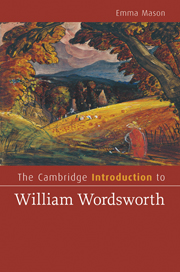Chapter 3 - Poetics
Published online by Cambridge University Press: 05 June 2012
Summary
Wordsworth thought a lot about how and why he wrote poetry. These ideas, or his poetics, centre on the notion that our entire experience and perception of the world is shaped through the medium of words, little units of meaning that have the power to modify and change the way we see and understand. Words take on even more significance for him when located within a poem: they are transfigured by different kinds of form, metre and rhythm that recast their meaning through sounds and patterns. He spent considerable time selecting each word that appears in his poetry, claiming to compose his verse and prose with the ‘slow and laborious hand’ of the memorial mason (PW, II.60). Words, Wordsworth stated, are ‘too awful an instrument for good and evil to be trifled with’, ‘an incarnation’ of our thoughts serving to give them meaning and vitality. Once language is used ‘only as a clothing’ for meaning, he argued, it becomes a ‘counter-spirit’ to understanding, dissolving our experience of life into abstraction (PW, II.85).
Wordsworth was concerned that his eighteenth-century predecessors, as well as many of his peers, had become locked into a dead and spiritless poetic language, employing only ‘mechanical’ and artificial words to write about ‘feelings and ideas with which they had no natural connection whatsoever’ (PW, I.131, 160). Their poetry seemed to him excessively stylized and fake, articulating ideas that were flamboyant or entertaining rather than authentic and real.
- Type
- Chapter
- Information
- The Cambridge Introduction to William Wordsworth , pp. 44 - 62Publisher: Cambridge University PressPrint publication year: 2010



